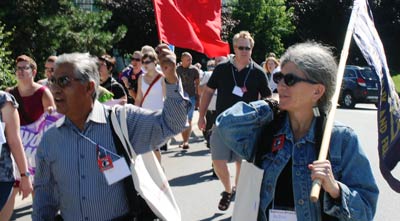
The Authentic Workers’ Front or Frente Auténtico del Trabajo (FAT) is an independent federation of labor unions, worker owned cooperatives, and farmworker and community organizations. In addition, a national women’s network, which coordinates work on gender and equity, is represented as part of the FAT’s leadership body, and operates within all of its sectors and zones.
The FAT was founded in 1960 and now represents workers in over half the states of Mexico in manufacturing industries such as textiles and auto-parts. In addition, the FAT represents workers in the transportation industry on a national level and service workers in Mexico City, as well as a large number of workers in the public sector. For example, a FAT affiliate in Chihuahua represents the vast majority of municipal workers in that Northern Mexican state.
Although modest in size, the FAT has great influence due to its principled determination to create independent, democratic unions under extremely adverse conditions. For example, the FAT was a founding member of Mexico’s independent labor federation, the National Union of Workers, or UNT. Benedicto Martínez, one of the FAT’s national officers, has repeatedly been elected vice president of the federation – a recognition of the role the FAT has played in its formation and in defining and developing its program of work and action. Subsequently, the FAT was also chosen to represent the UNT in its relationships with other organizations and in dealing with the press through the Secretaría de Relaciones.
The FAT was also a founder and active participant in RMALC (the Mexican Action Network Against Free Trade), the coalition of more than 100 Mexican organizations which opposed NAFTA, and has in recent years worked to analyze the impact of neo-liberal economic policies and create positive proposals for change.
UE-FAT Strategic Organizing Alliance
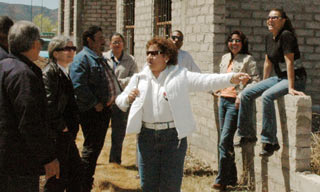
UE first came in contact with the Frente Auténtico del Trabajo (FAT) as a result of the fight to oppose the North American Free Trade Agreement (NAFTA). In 1992 the UE entered into a “Strategic Organizing Alliance” with the FAT which seeks to build a new kind of international solidarity focused on organizing and based on rank-and-file involvement.
We joined together with the goals of organizing, educating, promoting contact, and building cross-border solidarity between rank and file workers employed by the same transnational corporations or in the same sectors in the United States and Mexico; promoting the organization of independent unions; protecting the human and labor rights of Mexican and U.S. workers; and working together to improve wages, benefits, and working conditions on both sides of the border.
This work now includes an organizing team based in Mexico City, workers’ centers (Centro de Estudios y Taller Laboral A.C.) in Cd. Juárez, Monterey and Cd. Chihuahua, educational and solidarity work including worker to worker exchanges and cultural projects, an on-line monthly periodical — Mexican Labor News and Analysis — and work in opposition to corporate globalization. We include as a basic objective working to under-cut racist stereotypes, and have a particular emphasis on ensuring full participation by women and the development of their leadership skills.
From the beginning, our relationship has been based on a few principles: first, it is a relationship based on mutual respect – on solidarity not charity.
Second: it is based on communication with clarity about decision-making: the FAT is responsible for final decisions regarding work in Mexico, as the UE is for work in the US.
Third: we have tried to always do things in a bilateral way: so with worker to worker exchanges, UE members have traveled to Mexico and members of the FAT have come to the US. We have also engaged in cultural projects involving artistic exchanges and even a literary exchange: when Dale Hathaway wrote his book about the FAT in English he did it in connection with one of the activists from the FAT who wrote a very different book in Spanish.
What we’ve accomplished:
Short history of Strategic Organizing Alliance
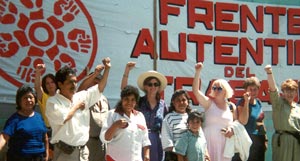
The UE and FAT view our work as a binational partnership which benefits workers on both sides of the border. When the North American Free Trade Agreement (NAFTA) was negotiated in the early 1990s, we realized that it would be a disaster for workers in all three countries. So, the first step of our new UE/FAT Strategic Organizing Alliance was a joint tour in the US, where a representative from the FAT spoke out in opposition to NAFTA.
We also support each others’ organizing work. Organizing in Mexico is extremely difficult, as it means taking on employers, official unions and the Mexican government in order to win the right of workers to organize real, democratic unions.
In its early years, the alliance helped win the first secret ballot election in Mexican labor history during an organizing campaign at the General Electric plant in Cd. Juarez. Joined by the Teamsters union, we also filed the first complaints under the NAFTA labor side agreement on behalf of Mexican workers who were fired by GE and Honeywell. Some years later, we helped build a tri-national union alliance around Echlin (later purchased by Dana), a transnational auto parts manufacturer operating in the U.S., Canada and Mexico. Together with eight other US and Canadian unions we defended the rights of our Mexican brothers and sisters who were confronted by armed thugs and forced to vote out loud when they attempted to organize one of Echlin’s Mexico City plants, ITAPSA. In actions at Echlin’s shareholders meeting and before the National Administrative Office in Washington and Ottawa, the Echlin Workers’ Alliance stood up together to back our commitment that an injury to one Echlin bargaining unit was an injury to all of us.
In 2010, FAT’s metalworkers’ union, STIMAHCS, won an amazing election at a UE sister shop in Mexico City.
Road to solidarity is a 2-way street
Although the UE has had occasion to support the FAT in a number of campaigns, this is definitely a two way street. The FAT provided critical support for a successful UE organizing campaign in a Milwaukee foundry. At the UE’s request, a rank and file activist from the FAT traveled to Milwaukee for two weeks in December to accompany UE organizers. In meetings with the workers, who were predominantly of Mexican origin, he was able to speak from his own experience in telling them that the UE is a democratic union, unlike the “official” unions in Mexico. Together with excellent work by staff and members, this led to a union victory at a 400 worker plant in Milwaukee!
Additionally, the UE and FAT have built a relationship between our public sector locals which has also provided solidarity through action in support of workers on both sides of the border. The International Worker Justice Campaign (IWJC) in North Carolina was directly inspired by the FAT’s use of international law to confront obstacles to organizing, and the knowledge, experience, and solidarity of our international allies have been crucial to the successes of that project. That campaign combines grassroots organizing with international law and has been tremendously energizing for the low-wage, primarily African-American workers in North Carolina’s public sector because it has turned the long-held belief that public sector workers “just don’t have that right” on its head: from the perspective of international human rights law, it is the state’s ban on collective bargaining that is “illegal,” not workers’ attempts to assert their rights.
International help for workers in North Carolina, Connecticut
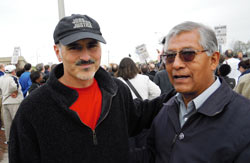
We have succeeded in ways few thought possible when we started. Sanitation workers in Raleigh walked off their jobs protesting intolerable working conditions. Although the strike was totally illegal, they had tremendous community support and won virtually all of their demands. We also won a stunning decision from the ILO, which called for the repeal of the prohibition on collective bargaining and recommended that the state should sit down with the unions to begin to discuss a framework for collective bargaining.
Although the IWJC has not yet achieved the goal of repealing the ban on collective bargaining, our efforts have totally changed the terms of discussion around collective bargaining and low-wage workers in the state. We have worked with other unions to build a strong coalition of labor, community, student and faith organizations in support of collective bargaining, and this effort has energized workers to take collective action to improve their wages and working conditions.
The relationship of solidarity between public sector workers also goes both ways. We began building direct ties specifically among municipal workers in North Carolina, Connecticut and Chihuahua, Mexico when representatives from those UE locals traveled to the Mexican state of Chihuahua and met with their counterparts in local municipal unions affiliated with the FAT.
A few months later, our Connecticut local returned the favor by inviting Daniel Martínez to visit them in Connecticut. Martínez is a heavy equipment operator in the small Mexican city of Guerrero and is a leader in his local union. He was able to meet with UE members at various workplaces and compare notes on subjects ranging from street maintenance to union rights.
In a meeting in Danbury, he was asked about increased immigration to the U.S. He explained that he thought that neither the U.S. nor the Mexican governments were dealing with the heart of the problem. He said: “The policies of our governments are making it harder and harder to find jobs that pay a decent wage. I, myself, came to work in the U.S., when I lost my job on the railroad when it was privatized.” When asked why he didn’t stay in the U.S., he said that when he was able to get his job with the city, he had the opportunity to return to Mexico. “I wanted to be there with my wife and for my kids as they were growing up.”
His visit had a profound impact on how UE Local 222’s membership – who are mostly European-American and African-American – view the immigration debate. Following this visit, that local initiated a “Buck-a-Brick” fund raising campaign to raise funds to help the Chihuahua municipal workers’ union complete the building of a union hall. This initiative, which came from the membership, not only raised funds for our allies in Mexico but became a mechanism for the local to engage their members, and members of other UE locals, in discussions about the importance of international solidarity. This effort eventually raised $1,300 to aid construction of the union hall in Guerrero, Chihuahua. The completion of the hall the following spring provided a further opportunity to deepen this relationship and was actually the occasion for some amazingly effective international solidarity which resulted in a commitment to reverse layoffs which had already been approved. International solidarity should always work this way!
Worker-to-worker exchanges
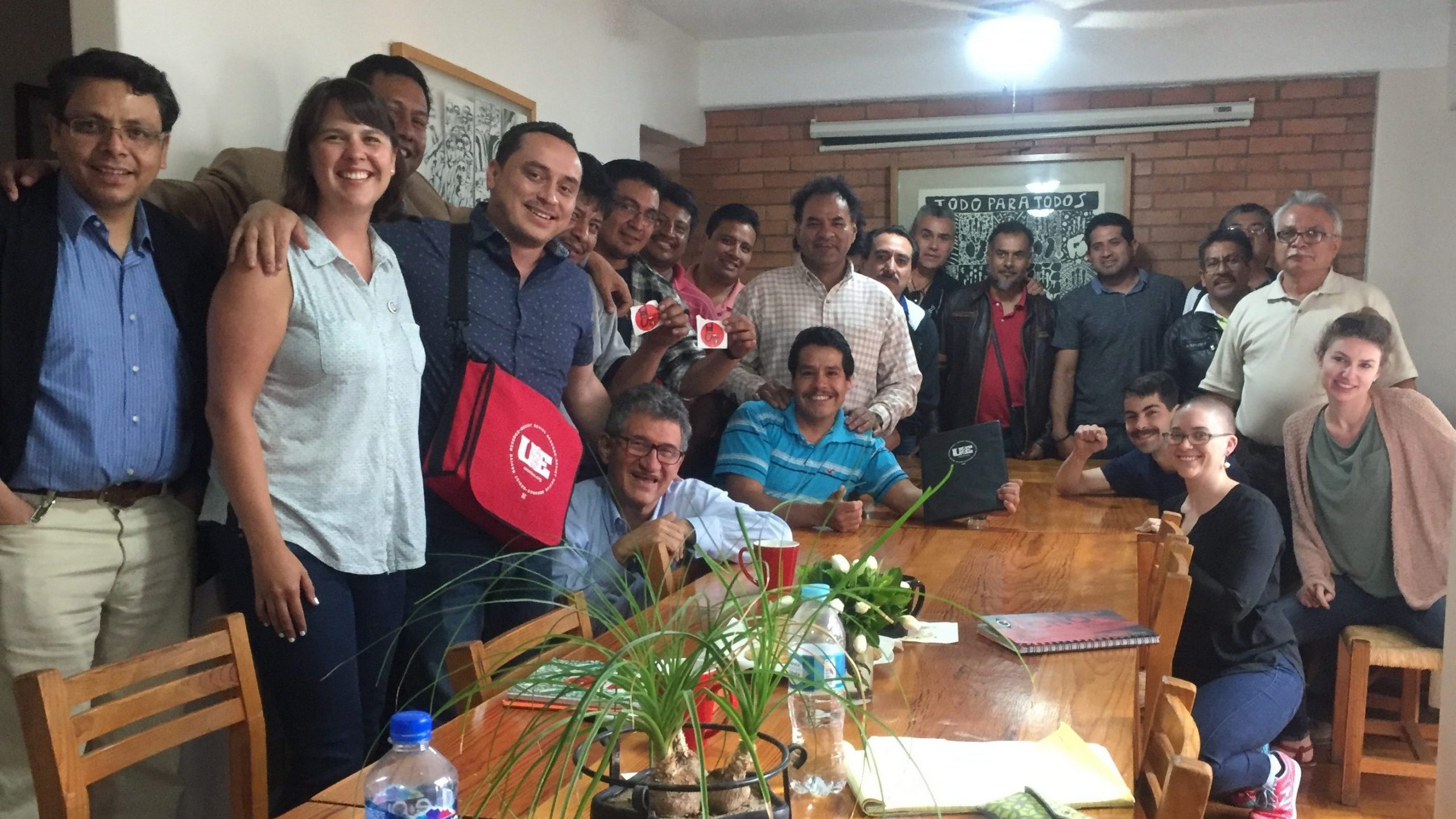
Worker-to-worker exchanges have continued to be a valuable and exciting part of the UE-FAT relationship, permitting rank-and-file members of both organizations to learn about each other, and take the information back to their locals and communities. UE and the FAT continue to use worker-to-worker exchanges with the goal of dismantling the stereotypes that exist on both sides of the border while deepening understanding of the actual conditions in the host country. These exchanges demonstrate that the most effective way to educate workers in the United States and in Mexico – and to motivate them to educate others – is through direct contact with each other. Rank and file members of the UE, FAT, and occasionally other organizations have toured plants, exchanged experiences, walked picket lines, attended meetings, assisted with organizing drives, taught high school and university classes, and participated in radio and television programs. Some have participated in more intensive training programs for rank-and-file organizers and for women.
A big vision?
Of course. Is it possible? Yes! The United Electrical Workers (UE) is working with unions, faith, community, university, and other organizations and activists to support the efforts of workers in Mexico to organize independent and democratic unions through financial contributions, targeted letter-writing and petition campaigns, by hosting delegations, and in various other ways. Please join us!
The FAT has undertaken campaigns against both Mexican companies and transnational giants such as General Electric, and can point to significant accomplishments. We need your help to increase the scope of the work and the pressure.
